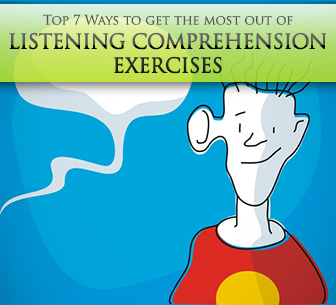Improving listening comprehension takes practice. There’s no way around that.
Still, if you want to maximize the opportunities for improvement, listening practice must be done just right. Here are some ways in which you can take your students’ listening skills from passive and dull, to active and sharp!

How to Make the Most of Listening Comprehension Exercises: 7 Ways
-
1
Introduce Key Vocabulary
You could give your students something to listen to and then go over vocabulary they may not understand. But it’s a whole lot better when you introduce key vocabulary before the listening, thus giving your students a better chance of getting the gist of the conversation.
-
2
Play It Twice
You know for a fact that when you listen to something, you pick up a lot more the second time. So, play the audio once to let students get the gist or answer basic true/false comprehension questions. Then, play it a second time and have them answer more specific questions or complete a worksheet. And if you have time why not have a third listening? After a third listening students may be asked to paraphrase or retell the situation in their own words.
-
3
Reuse Key Words or Phrases
It’s important for students to not only understand new words or expressions but also understand when and how they can use them. Say you listen to a conversation with some idioms related to health like “fit as a fiddle” or “under the weather”. Once students understand what they mean in the given context, ask them in which other situations they might be able to use these idioms: “When I catch a cold I feel under the weather.”
Bear in mind that words are the main carriers of meaning. The harder you work to help students remember new words, the more they will improve their overall listening comprehension.
-
4
Avoid an Excess of New Words
If in a three-minute listening exercise students encounter 10 new words, they will probably have a hard time understanding – even if you went over the new words first. They are still too many for them to grasp at once. Introduce 3-5 new words for each listening exercise, and tell them they should focus on these. Try to choose audio tracks or songs/lyrics for listening practice with only a few new words – avoid those that are filled with them.
-
5
Communicate the Goal
When we do listening practice we don’t just “listen”, and maybe hope students will understand and be able to answer questions later. Each listening exercise has to serve the purpose of a larger learning goal and must have its own specific objective.
Let’s see an example. Say you are practicing the present perfect because your goal for the day is to talk about things you’ve done and things you’ve never done before. You have a conversation your students can listen to that deals with this very topic. Their goal is to listen for what each speaker has already done and what they haven’t done yet. Be specific as you communicate this goal: Find out the two things Maria has already done and the one thing she hasn’t done yet.
There are songs that could serve the same purpose. Just be sure to choose audio that works for your students’ listening comprehension needs AND works for you.
-
6
Provide Context, if Necessary
I wouldn’t ordinarily recommend pressing play and letting students figure out what the context is, not unless you have advanced learners. Try to provide some context so students know what to expect. It’s as simple as saying: You’re going to listen to a conversation between two friends who are planning a surprise birthday party.
-
7
Eliminate Bad Habits
Some students can be very “high maintenance” when it comes to listening exercises and engage in behavior that is not conducive to achieving the listening goal. This is the type of behavior you should discourage:
- Raising hand/Interrupting to ask questions during the listening
- Asking you to stop and rewind before the listening is done
- Taking extensive notes/Attempting to write everything down
- Expecting to understand every single word
Be sure to tell students that none of the things mentioned above are necessary. Tell them you have planned the exercise with a purpose and tell them what it is. It may be to get the gist; it may be to find specific information. It will definitely not be for them to understand every single thing being said. Tell them they should be patient and try to listen to the whole audio before asking questions, especially if it’s a just few minutes long.
Listening may seem like a passive exercise, but there’s nothing “passive” about it.
There are no rules like those we have for speaking, but that doesn’t mean listening does not take a real, conscious effort. Still, this effort is not something that comes naturally to students. They must be taught the right listening strategies. And it’s our job to do just that.
Any thoughts? Sound off below!
P.S. If you enjoyed this article, please help spread it by clicking one of those sharing buttons below. And if you are interested in more, you should follow our Facebook page where we share more about creative, non-boring ways to teach English.







